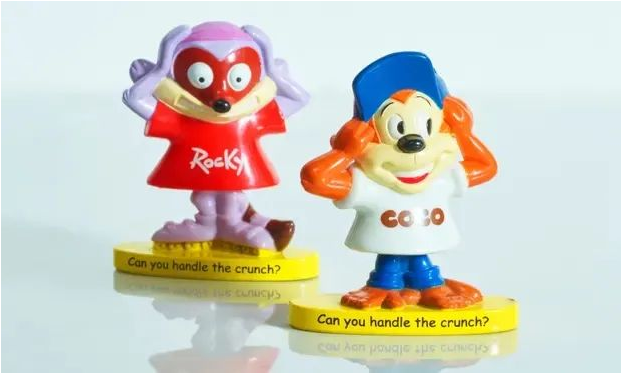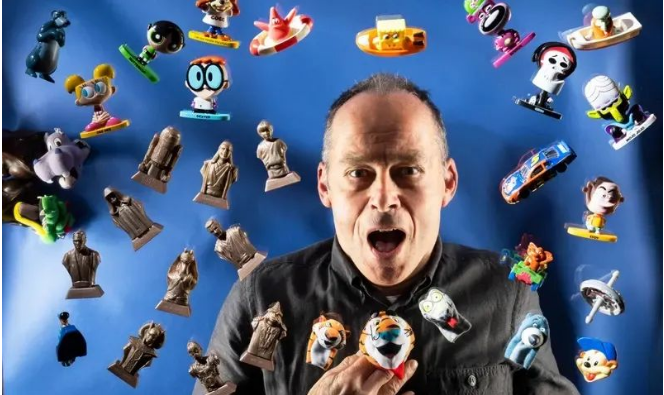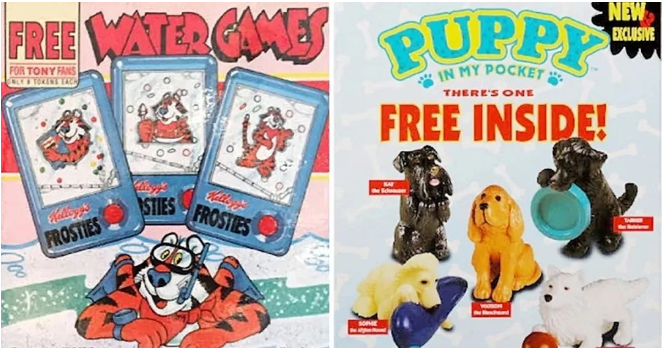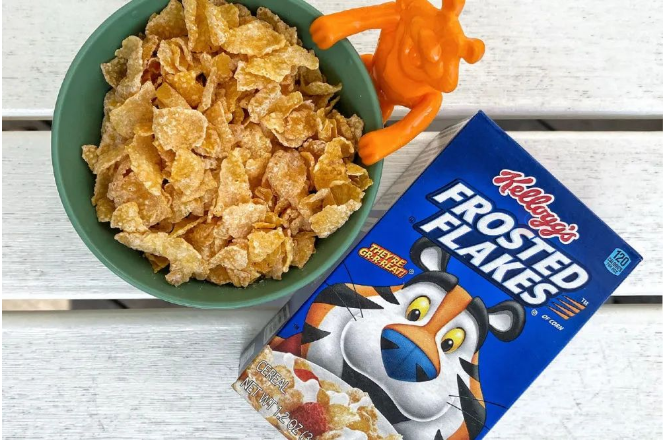Long history
The first ever buy-and-give sale dates back to 1905, when the Quaker Oats Company let customers who collected enough stamps redeem them for real porcelain bowls, and it wasn’t until the 1950s that food companies began putting freebies in boxes. Since then, toys have become one of the top freebies for food companies and have become popular.
In 1957, Kellogg introduced a miniature plastic submarine; That same year, Nabisco put “magical underwater frogmen” in its breakfast cereal Shreddies box; In 1966, honey flavored breakfast cereal (Sugar Puffs) sent farm animal toys; In 1967, the breakfast cereal Ricicles sent figurines of the British children’s character Noddy; In 1976, Kellogg’s gave Mr. Men stickers in a box of Coco Pops… In 1979, McDonald’s joined the competition and brought IP licensing into the toy giveaway, forming a trend.
By the 1990s, Kellogg’s alone had hired three promotional companies to come up with ideas for giveaway promotions. Logistix, one of its promotional partners, estimates that it has sold more than 1 billion toys.
It’s a gift but it’s not sloppy
Before designing toy giveaways, Logistix tracks all sorts of kid-related research: how much pocket money kids get, how many TV shows they watch, and so on. Logistix founder Ian Madeley says it’s challenging to create something that can grab a child’s attention for a few minutes. First of all, the cost should be controlled in the order of a few cents. And most of the toy themes were gender-neutral, in a few cases “boy-oriented” (because at the time, girls were happy to play with boys’ toys, but boys were not happy to play with girls’ toys). So before making a proposal to a food company, Logistix planners brainstorm with their own families to see if they can get approval from mothers and children. “Kids are very direct, they like it if they like it, they don’t like it if they don’t.” “Recalls product designer James Allerton.
There are plenty of other challenges. Again, consider the toys in Kellogg’s product box. The maximum size is 5 x 7 x 2 cm. James Allerton said: “When you design, you can’t exceed 1 millimeter. Moreover, the weight of each toy must be controlled within a certain range, so that it can be correctly placed into the packaging bag on the production line by the machine. At the same time, for safety reasons, toys must be tested for choking, such as no small parts that can easily fall off, in order to be suitable for children of all ages and to ensure that they are safe to use.
The general promotion will last from six weeks to three months. That meant Asian factories had to produce as many as 80 million toys at a time, so it took about two years from the idea to the box.
Changing times for toy giveaways
At present, the practice of giving toys in food has disappeared in the UK because of policy requirements.
In the mid-2000s, consumer groups began pressuring the government about healthy eating for children. Debra Shipley, a Labour MP, pushed through the Children’s Food Act, which restricts the way food is marketed to children. The use of toy giveaways as a means of promotion is one way that is restricted. The increased scrutiny has deterred cereal companies. In the UK, McDonald’s has weathered the storm and insisted on continuing to deliver toys in its happy Meals.
While banned in the UK, giving toys in food is thriving elsewhere.
Creata, a Sydney-based advertising agency that replaced Logistix as Kellogg’s toy giveaway partner, launched DIY minion-themed license plates in Australia and New Zealand in 2017. A plastic cereal toy mascot called Bowl Buddies that hangs on the side of a bowl was launched in North and Latin America in 2022.
Of course, the toy giveaways in these food boxes have changed with The Times. In the early 2000s, with the rise of home gaming consoles, cereal companies began offering boxed CD-Rom games, and later, kids were directed to websites or apps where they could play branded games. Recently, QR codes on Nabisco’s Shreddies breakfast cereal boxes directed customers to an “Avatar: Water” -themed augmented reality game.
Do not know, toy gifts will slowly disappear in the field of food?












